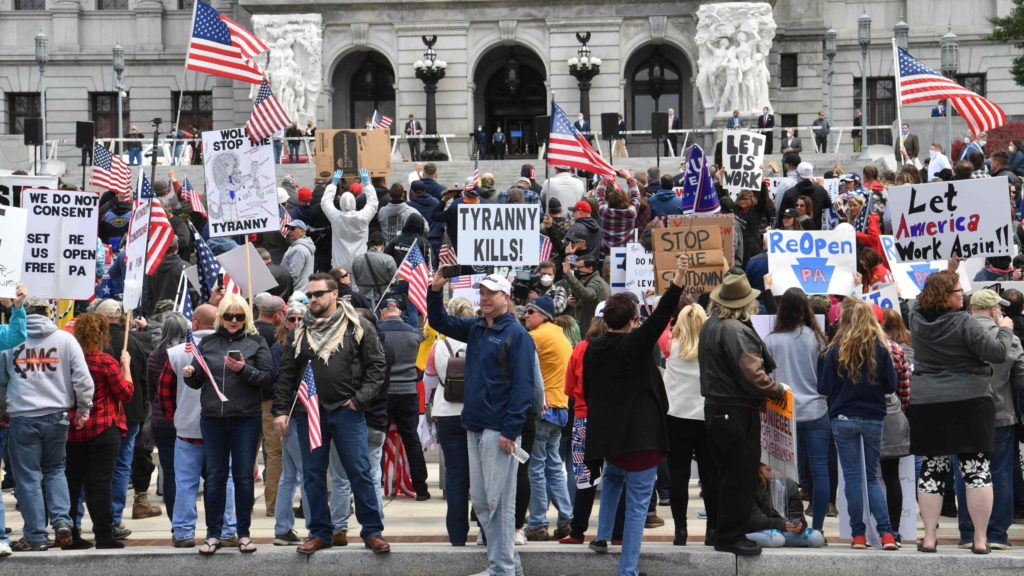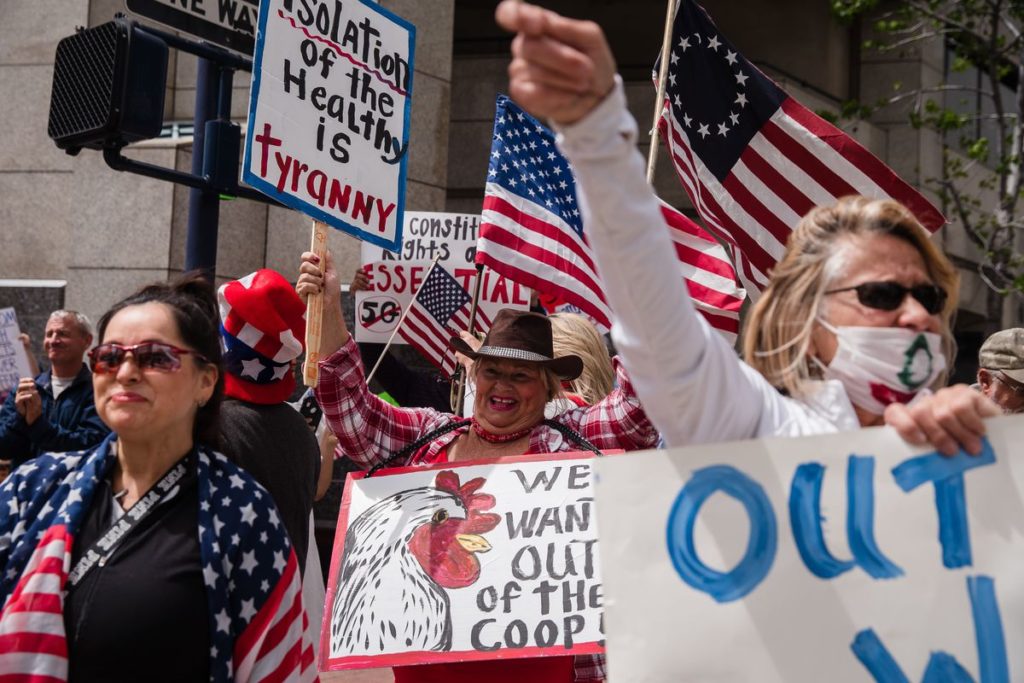RIO DE JANEIRO, BRAZIL – Gary Golden says that he had never, in his 55 years of life, displayed a poster. To debut, he wrote “Re-open Virginia” on a cardboard sign he held up last Wednesday at noon outside the governor’s office in Richmond, the state capital.

The poster is more discreet than the exuberant campaign banners for Donald Trump that flutter in the wind and are hand carried, along with an old Bible, by five individuals in cargo pants and black T-shirts having the logo of the Southern Patriot Warriors, a group linked with white supremacism.
The five demonstrators joined the protest against the measures to restrict freedoms enforced in the state of Virginia to contain the spread of the coronavirus pandemic. The United States leads the sad ranking of countries with the most deaths by Covid-19. By Sunday, May 10th, there were at least 78,855 victims of the disease, more than a third of confirmed deaths worldwide.
The protests in recent days in the United States congregate a varied universe of citizens, with the common denominator being a rigorous defense of individual freedoms. “This is not an uprising. We’re just a handful of frustrated people,” explains Golden.
As much as he disagrees with the Democrat governor Ralph Northlam, he would never display a poster like the one a few feet away that compares the governor to Hitler. “I’m Jewish, and of course the comparison fails,” he says. “But precisely because I’m Jewish, it affects me personally. I know about the pressure of a government on its citizens. My family has been through it. In the Holocaust, too, medical arguments were used to restrict freedoms.”
Born and raised in Chesapeake Bay, where Virginia settlers arrived in search of free land, at the age of 13 Golden joined with his parents and his little sister on a two-year crossing, aboard a 14-meter sailboat that took them through the waters of the Atlantic, the Caribbean, and the Mediterranean.
He returned, studied economics and, in 2014, sailed again for a year and a half, this time with his wife and son, with whom he now runs a boat insurance company in Fredericksburg (Virginia). “I’ve always considered myself a freedom fighter, but I’ve never really had the chance to fight for it,” he explains.
“This restriction of freedoms that we are experiencing is unprecedented. To me, society is nothing if it doesn’t honor individuals. Everyone now knows how to be careful, if they didn’t already know it. Most of those who protest against the confinement measures focus on the economy, but for me it’s a greater issue, that of freedom.”
For Ashlyn Landrum, 29, the economic issue weighs heavily. “Small businesses are vital,” reads the text of her poster, written in fine handwriting on pink cardboard. She owns a small make-up shop in Richmond that was forced to close during the pandemic.
“I will not rebound this year. No way. It’s all been lost,” she laments. “I can’t afford to support my employees, not even myself. My company is too small to apply for the government-approved loans. In the end, I got unemployment insurance, but it’s not even enough to pay the rent. People are very scared, they canceled [make-up] sessions until October. Fear is more powerful than the virus. It’s not just me. Richmond is a small business town. This affects everyone.”
Landrum came with her sister, Victoria, and her mother, Sharon. “To be free is our constitutional right. To protect our life, our freedom, and to seek our happiness. We must stand up for our right of assembly, which is now being challenged, and our right to religious freedom, which is also being challenged because the churches have been closed”.
“The government of Virginia should not have the power to restrict these constitutional rights,” said Victoria, 27, who works in the human resources department of an engineering company. For Sharon, the freedom of worship her daughter mentioned is the main reason she is protesting. “We cannot pray freely. And that’s very serious for me,” she explains.
“I go to Mass every Sunday, and during the week I meet with people from my church. Now we can’t meet, and prayer is virtual. That’s not what God wants. I’m horrified by the way they took away our freedoms in the blink of an eye.”

There are a dozen people protesting, cheered by a caravan displaying large American flags and from the Trump campaign, who go around the block honking their horn. They are part of the Virginians for Constitutional Rights 2020 group, which includes over 35,000 members on Facebook.
The group was founded by an anti-vaccination activist, using the name Reopen Virginia, but they changed the name so that Facebook would not shut it down. The social media giant announced on April 20th that it would remove the protest notices in certain states because they violated government guidelines.
A number of protests in the states of Michigan and Washington gathered hundreds of demonstrators. But the most common ones are small. Magnified by the far-right and applauded by President Trump (with attention focused on the November elections), protests against confinement spurred the libertarian spirit.
“The reaction to the pandemic could represent a caricature of what critics scorn of progressiveism,” writes John F. Harris, founder of the progressive ‘Politico’. “A state fraught with panic, reacting to headlines and hysteria, tramples on individual freedom and the private sector, thereby creating a problem for which the solution is an even greater extension of the state”.
The most frightening state intervention in the lives of citizens since World War II, some analysts caution, will produce collateral effects in American politics.
Here in Richmond, a man who claims that breathing behind a mask is harmful to health, has joined the conversation. He proposes to hang Bill Gates and Dr. Anthony Fauci, an epidemiologist who represents science in the White House response to the pandemic. When the Southern Patriot Warriors recognize an anti-fascist activist who films them with his cell phone around the corner, they head in his direction.
And they call him by his name. It’s Goad Gatsby from Richmond who tracks and documents different fascist groups on video. “Keep your distance,” says Gatsby. “Relax, I only have one thing to tell you,” answers one of them. “I have a Hiwaymen T-shirt for you, a real original Hiwaymen T-shirt. Next time I find you, I’ll bring my backpack and give it to you.”
The Southern Patriot Warriors, who attend nostalgic events of the pre-Civil War Confederate States, are a group that emerged from the Hiwaymen – one of the supremacist gangs that were involved in the Charlottesville riots in 2017.
At the time, an extremist drove his car into a crowd demonstrating against the riots, killing one person and injuring 19. Goad Gatsby was also there, among the counter-demonstrators: “There are very good people on both sides,” said Donald Trump at the time. “When people like this support their cause,” says Gatsby, “maybe you should reconsider your position.”
That’s not what the libertarian Gary Golden thinks. “Taking part in these protests allows me to meet these people who are fighting for the same thing I am, and hug them. We are forming a society,” he concludes.
Source: El País

